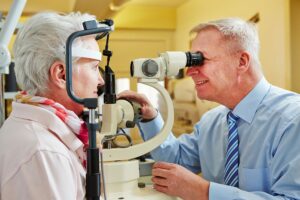Elder Care in Cranford NJ
As we age, we may notice a dramatic change in our vision; things that we used to see so clearly have suddenly become more difficult to view. Although there are several factors that can cause 
- Redness in the eye
- You see halos around lights
- Vomiting or feeling nauseous
- Feeling pain in the eye
- Loss of vision
- Tunnel vision, or narrowing of vision
- Hazy look in the eyes
Diagnoses
During an eye exam, the doctor will dilate the pupils in order to focus on the optic nerve. Other tests that can be done to diagnose glaucoma include:
- Tonometry: The eye is numbed with anesthetic drops, followed by the use of a tonometer. This device is used to identify the pressure of the eye by measuring its firmness or tone.
- Gonioscopy: A special contact lens with mirrors on the eye’s surface is placed on the eye after being numbed with anesthetic drops. Abnormalities can be detected by studying the drainage angle and the eye’s drainage area.
- Visual field testing: Both early and late stages of glaucoma can be identified by using a computer to measure the visual fields of each eye. This is an excellent test to have done in order to find out how damaged the optic nerve is.
- Ophthalmoscopy: A head-mounted device, handheld device, or special lens is used by the doctor to look directly through the pupil. This test will observe the optic nerve in order to discover if it is damaged at all.
- Pachymetry: The tip of the pachymeter touches the cornea, or front surface of the eye, very lightly after the eye has been numbed with anesthetic drops. This test finds out the thickness of the cornea in order to determine whether the patient is at risk. A thinner cornea may be a risk factor.
Treatment
The effects of glaucoma may be irreversible, but there are several ways it can be treated if detected early enough, including:
- Surgery: Laser surgery can be used to help increase the outflow of fluid from the eye or eliminate fluid blockage. Trabeculoplasty is a common form of laser surgery by using a laser to open up the trabecular meshwork drainage area. Trabeculectomy can also be used, which creates a new channel to drain fluid
- Eye drops: Eye drops can be used to reduce the amount of liquid in the front of the eye or increase its outflow.
The right treatment option is different for everyone, so talk to your doctor to find the perfect solution for you.
If you or an aging loved one are considering hiring elder care services near Cranford, NJ, call the caring staff at Helping Hands Home Care today at (908-418-4299).
Providing Home Care Services in all of Northern and Central NJ, including Clark, Westfield, Cranford, Scotch Plains, Rahway, Linden, Summit, Edison, Elizabeth, Mountainside and the surrounding areas.
Source
Glaucoma Research Foundation. “What are the Symptoms of Glaucoma?”
WebMD. “Glaucoma and Your Eyes.”
After graduating from Seton Hall University with a BS in finance Helping Hands Homecare’s Owner / President, Robert D’Arienzo, went to work on Wall St. for six years. However, after Robert’s grandmother became ill with stomach cancer Robert and his family needed to find assistance in the home for her. After many trials and tribulations Robert could see that there was a great need for quality home care services here in NJ and loved the idea of being able to assist other families who were going through what his family went through with his beloved grandmother.
Thus, Robert had found his passion. After almost a year of preparation Robert opened Helping Hands Homecare in 2003. Robert wanted Helping Hands Homecare to focus on providing the highest quality of caregivers, exceptional customer service, and providing a service that familys could depend on in their time of need. Since then Helping Hands has assisted hundreds of individuals with the simplest of needs to more complex cases while preserving those standards set out many years ago.
Robert is a Google Verified Author
- How Companion Care Can Help Your Parent Avoid Depression - April 22, 2025
- How Alzheimer’s Care Helps Family Caregivers - April 7, 2025
- How In-Home Care Can Help Seniors Recover from Surgery or Illness - March 24, 2025




